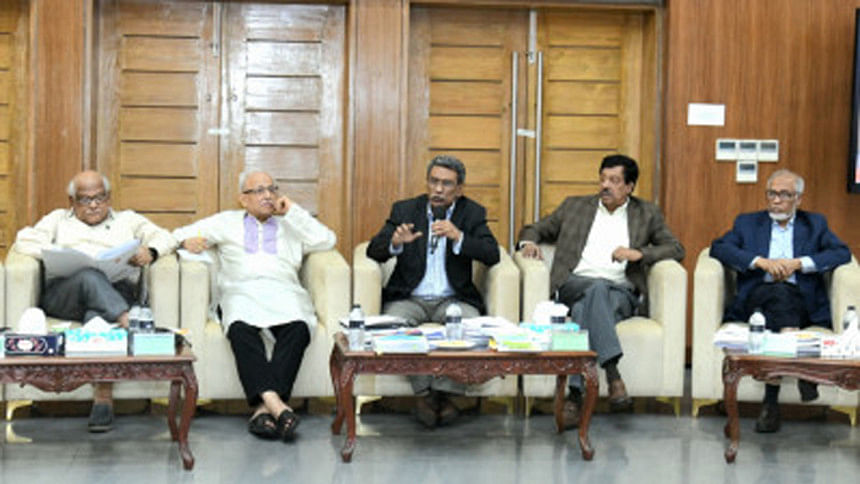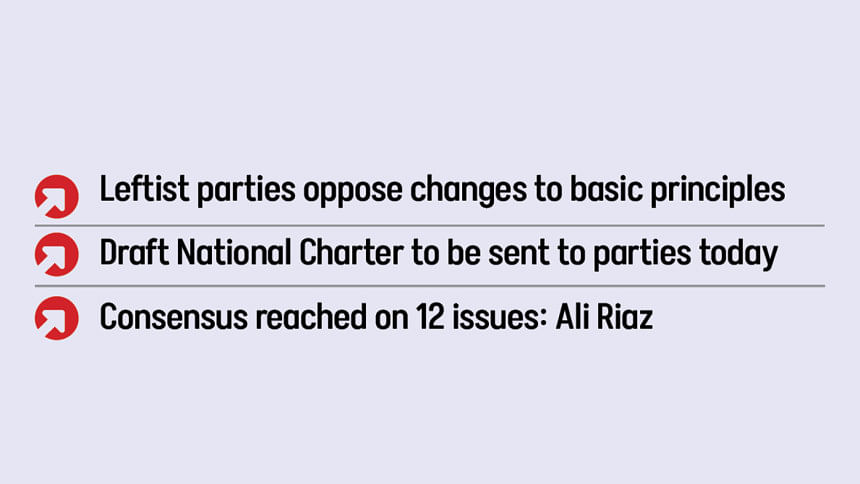Parties agree to cap PM’s term at 10yrs

Political parties have agreed that no individual can serve as prime minister for more than 10 years during their lifetime.
On the 19th day of the second phase of political dialogue, held at the Foreign Service Academy in Dhaka yesterday, they also agreed, in principle, to the formation of an independent police commission.
However, the discussion over the fundamental principles of the state in the constitution turned into a heated debate, as four leftist parties strongly objected to the National Consensus Commission's new proposal on the matter.
During the talks, consensus commission Vice-President Prof Ali Riaz said all the parties have reached an agreement on capping the number of years someone can serve as prime minister to 10 during their lifetime.
The commission first proposed that no individual can be prime minister for more than two terms. Disagreeing with the proposal, the BNP proposed that a person can serve more than two terms, as long as there is a break after two consecutive terms.
On June 23, all the political parties, except the BNP and two others, agreed that an individual cannot be the prime minister for over 10 years. On that day, BNP leaders did not support the 10-year cap. But they have changed their minds.
Jamaat Assistant Secretary General Maulana Rafiqul Islam Khan and National Citizen Party (NCP) Member Secretary Akhtar Hossen said their parties supported the 10-year cap.
POLICE COMMISSION
On the proposal to form an independent police commission, Prof Riaz said, "We will now hold discussions on its structure and formation process," adding that the police commission will ensure transparency, accountability, and public service orientation within the force.
In the proposal presented in the morning session, the consensus commission said the police commission will be led by a chairperson, who must be a retired judge of the Appellate Division and not over 75 years old. The member secretary will be a retired police officer, not older than 62 and who had served at least at the additional inspector general rank.
In addition to these two, the commission will have seven other members, one representative of the leader of the house, one representative of the leader of the opposition in parliament, one representative of the Speaker, and one representative of the deputy Speaker (from the opposition).

Other members will include a retired government official who had served as a secretary or ranks above, a retired judge who served at least as a district judge, and a human rights activist with a minimum of 10 years of experience in a registered human rights organisation, either domestic or international. At least two of the commission members must be women.
Key objectives of the police commission will be to ensure that the police can carry out its duties competently and within the bounds of the law.
The commission will also serve as a mechanism to resolve complaints raised by police members themselves as well as those filed by citizens against police personnel.
BASIC PRINCIPLES
The four parties that opposed the proposal on basic principles of the state are the Communist Party of Bangladesh (CPB), Bangladesher Samajtantrik Dal (Basad), Bangladesher Samajtantrik Dal (Marxist), and Bangladesh Jatiya Samajtantrik Dal (Bangladesh Jasad).
In the proposal, the consensus commission said that regardless of which fundamental principles remain in the constitution, "equality, human dignity, social justice, democracy, and religious freedom and harmony" must be included as core constitutional principles.
In its counter-proposal, CPB General Secretary Ruhin Hossain Prince suggested that "equality, human dignity, social justice, and religious freedom and harmony" could be added to the four principles in the 1972 constitution: nationalism, socialism, democracy, and secularism.
During the discussion, BASAD General Secretary Bazlur Rashid Firoz and BASAD (Marxist) leader Masud Rana voiced their support for the CPB's stance.
They asserted that they would not accept any form of consensus, even one accompanied by a note of dissent, and warned they would withdraw from the process if any decisions were made regarding the basic principles.
Firoz reminded Prof Riaz that he had defined "consensus" as "an agreement that must include all parties".
Speaking to reporters during the lunch break, Prince said, "It's not possible to achieve national consensus on the fundamental principles of the constitution through this process, as participants represent diverse ideological backgrounds. The matter must be placed before the people. Political parties should declare their positions publicly, and the people should decide."
Prince further warned that manipulating or altering the constitution's core principles by dint of majority would constitute a betrayal of its Liberation War roots.
"If this continues, our regular participation in the commission's dialogue will be at risk," he said, warning that such moves could derail the entire consensus-building effort.
Several political parties, including the BNP, Jamaat-e-Islami, NCP, and Khelafat Majslih expressed support for the commission's proposal.
On state principles, BNP Standing Committee member Salahuddin Ahmed said his party disagrees with the current version adopted through the 15th amendment to the constitutions and prefers the earlier one under the 5th amendment, but has no objection to adding "equality, human dignity, social justice, and religious harmony" as proposed.
Jamaat wants to restore "absolute trust and faith in Almighty Allah" as a core principle of the constitution, said party Assistant Secretary General Maulana Rafiqul Islam Khan.
Liberal Democratic Party (LDP) Chairman Shahadat Hossain Selim said, "Most political parties agree that a return to the 1972 constitution is not practical, as socialism has become globally outdated."
NCP Member Secretary Akhter Hossen also welcomed the proposal, saying, "We support the commission's draft and do not wish to revisit past ideological debates."
On June 25, the consensus commission placed new proposals regarding basic principles of the constitution. The Constitution Reform Commission had previously proposed "equality, human dignity, social justice, democracy, and pluralism" as the basic principles of the constitution.
Due to the division among the parties, the revised version has now replaced "pluralism" with "religious freedom and communal harmony".
The BNP, Jamaat, and several other Islamist parties were against "pluralism" as a basic principle.
WOMEN'S REPRESENTATION
No consensus was reached on the final topic of the day: women's representation in parliament.
The commission proposed maintaining the existing 50 reserved seats for women and requested political parties to nominate women candidates in at least one-fourth or one-fifth of the 300 general seats.
The BNP proposed that parties nominate women in at least 5 percent of the 300 general seats in the next election, and gradually raise it to 10 percent.
"This would ensure 80 seats for women when combined with the existing 50 reserved seats. This can begin as a gentleman's agreement and be formalised later through constitutional amendment," Salauddin said.
Rafiqul said Jamaat supports a 400-seat parliament with 300 general and 100 women's seats, with women's representation determined proportionally based on party votes under a proportional representation (PR) system.
On July 14, the commission proposed abolishment of the current system of reserving seats for women. It recommended that parties contesting for at least 25 constituencies nominate women in one-third of these seats under the first-past-the-post system, where the highest vote-getter wins.
This issue has been discussed repeatedly during the reform talks, but parties remained divided.
Initially, the commission had proposed increasing the number of reserved seats for women from 50 to 100 and suggested direct elections to these seats.
In his opening speech yesterday, Prof Riaz said a preliminary draft of the National Charter will be sent to political parties tomorrow and it would not be discussed during the dialogue unless there were significant objections.
"If there are fundamental disagreements, we will bring it into the discussion. Otherwise, we will not. Any feedback from your side will be incorporated. The preliminary charter will include background, context, and areas of commitment," he added.
He also informed that a specific day would be allocated in the dialogue to officially sign the National Charter.
The commission aims to conclude the dialogue by July 31.
So far, consensus has been reached on 12 issues. Discussions on seven remain incomplete, while three topics have not been talked about yet, Riaz said.


 For all latest news, follow The Daily Star's Google News channel.
For all latest news, follow The Daily Star's Google News channel. 




Comments